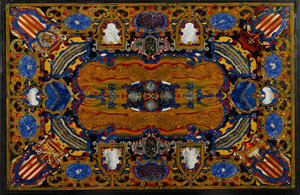£3.5m Italian table top at risk of leaving the UK
Culture Minister Ed Vaizey has placed a temporary export bar on the table top so a buyer can be found to keep it in the UK

Grimani table top
A rare Italian table top decorated with the coat of arms of a noble family is at risk of being exported from the UK unless a buyer can be found to match the asking price of £3,509,000 (plus £701,800 VAT). Culture Minister Ed Vaizey has placed a temporary export bar on the table top so a buyer can be found to keep it in the UK.
The table features the arms of the Grimani family, who were high profile traders, politicians and theatre owners in 15th and 16th century Venice. It contains a range of coloured stones framed in silver and inlaid in the pietre dure mosaic technique. Pietre dure tables were prized across Europe and often given as diplomatic gifts.
The table top belonged to Patriach Antonio Grimani, who was a Vatican ambassador in Florence in 1608. It was brought to England in the 19th century by the 3rd Earl of Warwick, as part of his interior decoration of Warwick Castle.
Culture Minister Ed Vaizey said:
This rare table top is incredibly beautiful and important to our understanding and study of 17th century craftsmanship.
I hope a buyer can be found to keep this ornate example of pietre dure in the UK.
The decision to defer the export licence follows a recommendation by the Reviewing Committee on the Export of Works of Art and Objects of Cultural Interest (RCEWA), administered by The Arts Council.
The RCEWA made its recommendation on the grounds that the table top is of outstanding aesthetic importance, and outstanding significance for the study of Italian pietre dure and of Grand Tour collecting.
RCEWA member Christopher Rowell said:
This magnificent table top, made in Florence in the early seventeenth-century, is a tour de force both of design and of craftsmanship. It is executed in bold colours making dramatic use of expensive blue lapis lazuli as a foil to the reddish orange, yellow and green of exotic agates and jaspers. The arms and attributes of the patrician Grimani family are proudly and prominently displayed and the table is described in a will of 1623. Each individually cut piece of marble or semi-precious stone is framed – like jewellery – in silver, as in the so-called ‘Pope’s Cabinet’ at Stourhead, Wiltshire (NT), which was made in Rome around 1580, probably for Pope Sixtus V. The Grimani table top represents a pinnacle of perfection in the history of hardstones manufacture. It was purchased for Warwick Castle in 1830 by the 3rd Earl of Warwick, who provided a new wooden frame to support it because the Grimani retained the original giltwood table base. Its Venetian, Florentine and English history increases the lustre of this masterpiece. Every effort should be made to keep it in Britain.
The decision on the export licence application for the table top will be deferred until 12 September 2016. This may be extended until 12 February 2017 if a serious intention to raise funds to purchase them is made at the recommended price of £3,509,000 (plus £701,800 VAT).
Offers from public bodies for less than the recommended price through private treaty sale arrangements, where appropriate, may also be considered by Ed Vaizey. Such purchases frequently offer substantial financial benefit to a public institution wishing to acquire the item.
Organisations or individuals interested in purchasing the table top should contact the RCEWA on 0845 300 6200.
An image of the table top can be downloaded here.
For media information contact: Francesca Roettger Moreda
Tel: 0207 211 6263
Notes to Editors
Organisations or individuals interested in purchasing the table top should contact the RCEWA on 0845 300 6200.
Details of the table top are as follows:
- An Italian pietre dure table top
- H: 6cm L: 150cm W: 111.5cm
The Reviewing Committee on the Export of Works of Art and Objects of Cultural Interest is an independent body, serviced by The Arts Council, advises the Secretary of State for Culture, Media and Sport on whether a cultural object, intended for export, is of national importance under specified criteria.
The Arts Council champions, develops and invests in artistic and cultural experiences that enrich people’s lives. It supports a range of activities across the arts, museums and libraries – from theatre to digital art, reading to dance, music to literature, and crafts to collections. www.artscouncil.org.uk